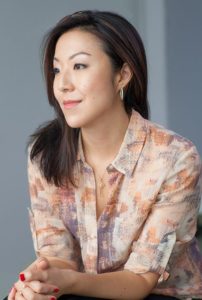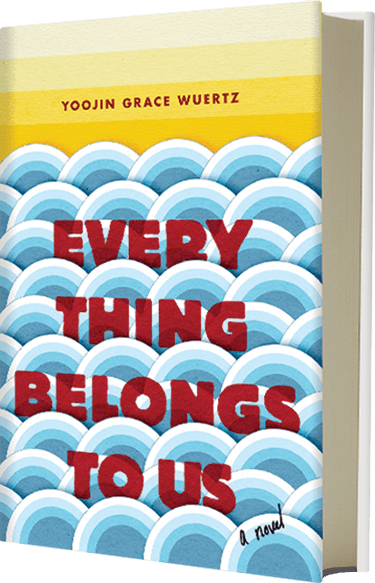Author Yoojin Grace Wuertz on the three things she took from becoming a mother and writing her first book at the same time.

1. Things are messy. It's normal.
Writing and parenthood are both messy, overwhelming processes. No matter how much you try to scaffold with lists, outlines, and plans for milestones—if plans and outlines are generally helpful to you—they will not change the fact that there is a certain amount of chaos. Embracing the chaos as a crucial part of the magic is important, both to the work and to mental health.
E.L. Doctorow famously said that “Writing is like driving at night in the fog. You can only see as far as your headlights, but you can make the whole trip that way.” I have always loved this quote because it gives writers the permission to be and feel lost, even as you’re actually en route to your destination. While writing my first novel, I was heartened by this quote—I wrote the first draft without any outlines or plans—but realised in subsequent drafts that I work much more efficiently (and happier) with an outline. If I were to continue Doctorow’s analogy, an outline for me is like having a police escort in the fog. Police with searchlights and access to emergency personnel.
Still, I've realised even a great outline isn't meant to be ironclad. I'm currently working on my second novel, and the very detailed outline I made prior to writing got me 50% through the first draft before I realised I had to go “off-road.” The actual writing showed me that the outline was paced too fast and that the characters required more time to develop the conflicts. It reminds me of the joke I've heard from other writers with kids: parenting is making logistically perfect plans and immediately having to abandon them because everything changes.
2. Ignore at least 80% of what people tell you. They haven't thought as much about your book (or your kid) as you have.
I was lucky to know many wonderful, experienced parents by the time I had my son at age thirty-five. Their primary advice to me was to ignore any advice, solicited or not, that didn't help me. This was wise counsel and I've applied it to my writing career as well. Both parenting and published writing are public-facing occupations. Sometimes we are tricked into thinking this is not true because most of the writing gets done in solitude, as most of the parenting gets done in private, within the walls of your home. However, unless you are J.D. Salinger or the parent equivalent of Jon Hamm’s character in Unbreakable Kimmy Schmidt (which I hope you are not), then eventually your intensely private choices will face public scrutiny. Fine-tuning that balance of which voices to listen to while making those countless minute and major choices has helped me to find and trust my own voice as a writer and parent. It’s an ongoing process, since writing and parenting are both fluid endeavours and we all hope to keep growing and rising to the occasion.

And not every bit of counsel from even the most trusted sources is helpful at every moment. The trick is staying open to a diversity of voices while using your own voice as the judge. To return to E.L. Doctorow and his headlights analogy, I once heard Ann Patchett say in an interview that she does not start writing until she has a firm outline of her story from beginning to end. Deep in headlights territory at the time, I was astounded—and more than a bit intimidated—by this admission. Who could work like this? I thought. Patchett writes rich, complex novels of epic proportions. It was like hearing that she could drink the ocean in a gulp. But I kept this bit of information tucked away in my mental files, and when I became stuck enough to finally consider new methods, I channelled Ann Patchett and tried an outline. And haven’t looked back since. When it comes to advice, my philosophy is to listen to everything but to use only the things that help at the time. Separating the wheat from the chaff can be annoying work, but writing is a long-term endeavour, and you never know when a bit of years-old advice will suddenly become your saviour.
3. Be the writer--and the parent--you actually are, not the one you think you should be.
I was in a Ph.D. program for English literature at U.C. Berkeley when I decided to leave the program and try my hand at writing fiction. My Ph.D., by the way, was supposed to be in Early Modern English Literature, aka Shakespeare and Milton. I had majored in English at Yale, where I took classes in gender studies and “multi-culturalism” (which is a word no longer in vogue as it was in the late 90s and early noughts), but the bulk of my reading was still in the Western canon. White male writers. White male characters. When I started thinking about writing my own fiction, I was blocked for a long time because I (unconsciously) thought I had to write about white characters. As a Korean-American who grew up speaking Korean at home and socializing with other immigrant families, I did not know a lot about white people except in books. And yet I thought this was what fiction looked like, and since I loved fiction I thought that’s what I had to replicate. Of course this isn't true, but it was an assumption I had to overcome. I realized if I was going to write at all, my stories would have to be about Korean Americans, since these were the stories and the people occupying my mind. And then: I wondered if anyone would want to read about Korean Americans, or would my writing be relegated to “multi-culturalism,” in some specialized corner of the bookstore that only people who looked like me would ever go.
At some point, I had to let go of these fears and write the book I wanted to write. The book I was uniquely equipped to write, because of my experience, my point of view, my particular set of strengths and interests. I had to be the writer I was, and not some projection I had picked up over the years. We all have aspirational ideas of what kind of person is a real writer, a great artist, an ideal parent. Rarely do we imagine ourselves to be that person, that writer, that parent. It turns out the hardest person to fight is yourself: and if you need permission to be the writer that you already are, then here it is. Be the writer you already are.
Yoojin Grace Wuertz was born in Seoul, South Korea, and immigrated to the United States at age six. She holds a BA in English from Yale University and an MFA fiction from New York University. Everything Belongs To Us is her debut novel which was selected as a New York Times Editors' Choice. She lives in northern New Jersey with her husband and son.
Comments